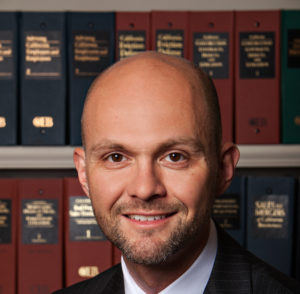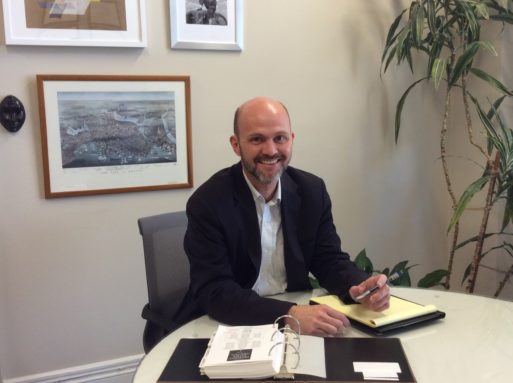Today SevenPonds speaks with Joseph Ferrucci, Attorney at Law P.C., whose San Francisco law office provides a full range of legal services relating to estate planning, estate administration, conservatorship and special needs, and real property.
Editor’s Note: This interview has been edited for length and readability. In addition, the conversation contains general information about legal topics. It is not, and is not intended to be, personal legal advice, as every case is unique. If you have questions about your particular case, consult with a licensed, qualified attorney who knows your state laws.

Joseph Ferrucci
Laura B. Hayden: Hello Joe. As we begin our conversation, I can’t help but be reminded of Benjamin Franklin’s observation that nothing in our world is certain, except death and taxes. We must acknowledge both in estate planning. When and where do we start?
Joseph Ferrucci: It’s never too early for an adult to prepare a set of legal documents that details instructions for the time of incapacity and death. An estate plan will communicate your wishes and will make it easier for your loved ones to take charge of your affairs. It can reduce legal fees, delay and hassle too. Yet statistically the majority of American adults do not have any estate plan documents in place.
Laura: That’s concerning. What documents constitute the plan?
Joseph: Most people start with a will when they are married and have young children. A will names an executor who will oversee the implementation of your estate; states who you want to inherit your property; and names a guardian to care for your young children should something happen to you and the other parent. Along with the will, a typical estate plan includes a General Durable Power of Attorney and an Advance Health Care Directive and sometimes a Revocable Living Trust.
Laura: What happens if you die without having an estate plan?
Joseph: Every state has a “default” plan for the distribution of property in the event that you die without a will. The laws follow a predefined formula and might not be what you want or expect. Some of your assets may be distributed by means of joint tenancy (when the estate or property is owned by two or more parties) with right of survivorship, transfer on death or beneficiary designations. Without a will, state law will determine who is entitled to receive your remaining assets.
According to California law, estates with assets worth $150,000 or more, or having interests in real property worth more than $50,000, will be subject to probate, a court process. The court appoints an administrator, then oversees the work of the administrator, and ultimately approves distributions. Many people prefer to avoid probate because the proceedings are costly and even the simplest proceedings take six to 12 months.
Other states may have different rules for what estates will be subject to probate. Also, six to 12 months is common in California but might differ in other states.
Laura: Is that when the state collects taxes on your estate?
Joseph: Actually, thanks to the new tax law, virtually all estates are exempt from the federal estate tax. The new exemption is more than $11 million, or $22 million for a married couple, which is more than double last year’s estate tax exemption. That means that under the new law almost all estates will NOT owe any federal estate tax. The exemption amount will rise with inflation each year. This high exemption is scheduled to sunset, though, at the end of 2025. The estate tax has become a hot-button political issue, so the estate tax laws may change again depending on politics.

Joseph Ferrucci spending time out of his law office
Besides the federal estate tax, some states have estate taxes too, and the state exemption level may be lower than the federal exemption. So you might still have to plan for estate taxes at the state level depending on the size of your estate.
Laura: Moving on to the other documents, I know power of attorney gives someone else the authority to authorize one’s financial decisions. Is the General Durable Power of Attorney part of an estate plan the same?
Joseph: No, there’s an important difference. A power of attorney is a document you can use to appoint someone to make decisions on your behalf. But that power is no longer valid if you become incapacitated. If the power of attorney is durable it remains valid and in effect even if you become incapacitated and unable to make financial decisions for yourself. It clearly states what powers your agent has while you are incapacitated.
Laura: I see. That’s a huge distinction I wasn’t aware of. You also mentioned an Advance Health Care Directive. Is that the same as a living will?
Joseph: There are two parts to writing out your wishes for health care. Part one, the power of attorney for health care, gives someone you choose the power to make medical decisions if you can’t. Part two, the living will, is an additional provision for termination of life support and treatment, particularly in the event of a terminal illness or irreversible coma. In California, these documents are combined into one and called an Advance Health Care Directive.

Joseph Ferrucci
Laura B. Hayden: You talked about the importance of having a Will, a General Durable Power of Attorney and an Advance Health Care Directive in an estate plan. You also said that sometimes a Revocable Living Trust is beneficial. Can you elaborate on that?
Joseph Ferrucci: A Revocable Living Trust is a tool for avoiding probate, which is a court process. I often tell my clients to imagine they place all of their assets a box. That container is the trust. It’s “living” because you establish it during life.
Laura: How is that different than a Will?
Joseph: A Will comes into play only after you die, but a living trust can actually start benefiting you while you are still alive. During your lifetime, you serve as your own trustee, and you can use the trust assets for any purpose. Also, it is “revocable” because you have the power to revoke or amend it. Upon your death, a successor trustee whom you pick would then distribute the trust assets to your named beneficiaries, without the need for probate and usually with less cost and delay.
To give you an example, I had a client several years ago who has since passed. He had done very well in business, owned a home and three rental properties and had other savings. His Revocable Living Trust gave him control of his assets in life and saved his family the time and cost of going through probate after he died.
Laura: What do you say to people who may think estate plans are only for the wealthy?
Joseph: People who are wealthy may need more complex estate plans to avoid or reduce the estate tax and the generation skipping transfer (GST) tax. But very few estates are subject to the estate and GST taxes. The primary purpose of an estate plan is to identify the beneficiaries of estate assets and to name trustees, executors, financial agents and health care agents. Everyone needs an estate plan for this primary purpose.
Laura: Online companies like LegalZoom offer customers the opportunity to create the estate plan documents we’ve discussed. Is there a “caveat emptor” connected to this do-it-yourself process our readers need to know?
Joseph: LegalZoom and other do-it-yourself legal document companies are not lawyers and can’t give legal advice. The documents are one-size-fits-all. There are limits on how much you can tailor them to your unique circumstances. You also lose out on the advice, opinions and strategies you can get from a lawyer.
Laura: What might the consequences of that be?
Joseph: One example would be if a client has kids who don’t get along, how can the estate plan be set up to avoid a fight? That’s where a lawyer’s advice is critical.
If it is too expensive to hire a lawyer, some states offer free document templates. The State of California has a fill-in-the-blank “statutory” will, available for free online, that can work well for California residents who have relatively uncomplicated estates.
Wills are based on state law, and while there are some similarities from state to state, each state’s laws are different. The DIY documents are not always in sync with the laws in every state. I would suggest that anyone who uses a DIY legal form service arrange a consultation with a lawyer in their state to be sure the documents meet their individual needs and will work under the laws of that state.
Laura: All this has been extremely helpful. I’m sure many of our readers will start taking steps to create their own estate plans now that you’ve explained the documents and process so well. Thank for sharing your time and expertise with SevenPonds.

 What Does an Estate Plan Cover and How Do You Make One?
What Does an Estate Plan Cover and How Do You Make One?


 “Help Me, Helen”
“Help Me, Helen”
 Recovering Cremation Remains After the Los Angeles Fires
Recovering Cremation Remains After the Los Angeles Fires
 “As Tears Go By” by Marianne Faithfull
“As Tears Go By” by Marianne Faithfull














